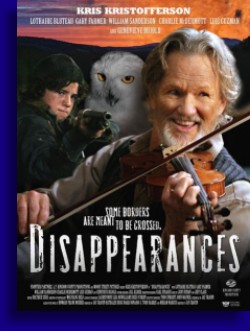

Reviewed by
Christopher Armstead


Let me be first to say that I didn’t come close to getting ‘Disappearances’. Those who have gotten this film have said that with each successive viewing they begin to understand it more and more. The director, Jay Craven, has an online manifesto that he will be more than willing to send you breaking down the subtle nuances and hidden meaning and innuendo in his film. Deal is though I have no desire to watch any movie five times unless I’m getting a college credit, so if I don’t get it after sitting through it once, chances are I’m not going to get it. So keep that in mind as I run through what I have seen in the rather confusing coming of age / bootleg picture, ‘Disappearances’.
It’s prohibition 1920’s America, somewhere in Vermont just south of the Canadian border. Fourteen year old Wild Bill Bonhomme (Charlie McDermott) is a winsome, curious boy who idolizes his somewhat scurrilous father Quebec Bill Bonhomme (Kris Kristofferson). Quebec Bill, along with his Native American brother-in-law Henry Coville (Gary Farmer) used to run shine across the border back in the day, but Quebec Bill has become all domesticated, trying to run a farm and kow-towing to the wishes of his wife Evangeline (Heather Rae). But this is the depression era and even trying to rustle up enough cash to feed the herd of steer is a challenge, and with the farm on the verge of collapse Quebec Bill has decided that it’s high time to get back into the bootleg business. Now Bill Sr. thinks Bill Jr. should come along on this incredibly dangerous liquor run, but Evangeline says nay. Wild Bill’s introspective aunt and mentor Cordelia (Genevieve Bujold) dispels Evangeline concerns informing the woman that this is a Bonhomme legacy, and robbing the boy of this opportunity would be robbing him of his heritage. Of course this sounds plain nuts to me and perhaps someone should call protective services, but whatever we have to do.


So the Bonhomme men, Henry and field hand Rat (William Sanderson) set about to Canada to steal as many cases of whiskey they can carry from the rouge French Canadian pirate Carcajou (Lothaire Bluteau) and the adventure has begun. There are gunfights, train robberies, sea battles (okay, lake skirmishes), and true to title, disappearances aplenty as our heroes do battle with a regenerating bad guy as allegory and subtext are the order of the day.
The question that one will ask themselves after watching ‘Disappearances’ at least once is ‘What is real and what isn’t?’ For instance, Aunt Cordelia seems real, but then later on she has the knack of appearing in the woods talking to Wild Bill, delivering him a cryptic lesson and then disappearing, which I’m sure meant something way deep. The Villain Carcajou, not unlike Jason Vorhees, kept reappearing to terrorize Wild Bill and the crew no matter how many times they killed him, and I’m sure that meant something as well. A frozen fish comes back life, an owl keeps making unannounced appearances, things just disappear out of the blue sometimes to reappear, oft times leading one with to sit back slack jawed and mumble ‘what the…’.
‘Disappearances’ is a beautiful film however. The rural landscapes of Canada in the 1920’s, or wherever they shot this thing to make it look like 1920’s Canada was breathtaking and became a character all to its own. Kris Kristofferson has been playing old crusty curmudgeons since he got his first gray hair thirty years ago and you’d be hard pressed to find anybody who does it better than he can. Man I loved that dude in ‘Lone Star’. A movie I only had to watch one time to ‘get’ by the way. Young Charlie McDermott brought a grounded sensibility to the role of the younger Bill since he was the one saddled with being the grown up out of the bunch, and Craven’s leisurely pace of the film fit perfectly with the subject matter.
But ultimately I didn’t ‘get’ it. I didn’t understand it. I don’t know where he was going with it and I didn’t know what it all was supposed to mean. The work was based on a novel written by Howard Frank Mosher and though there’s no way in hell I’m watching this thing more than once, I am willing to read a book so maybe that’s my next order of business. I’ve never claimed to be the brightest bulb in the box so those of you with more patience and deeper concept of the ethereal than I, may find ‘Disappearances’ to be quite the marvel of subtle revelation. What I saw however was one of the pretty canvases that you find at your art museum that, while interesting to look at, make absolutely no sense whatsoever.

